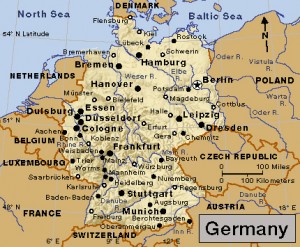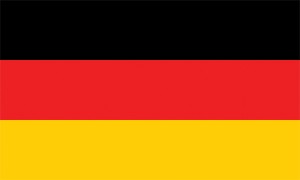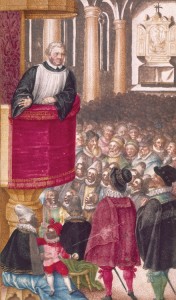Language Monday: German
Monday, March 26th, 2018March 26, 2018
Heute ist Montag—that is to say, Today is Monday.
On this Montag, World Book takes a look at a language closely related to English—German. In fact, English is a Germanic language, so it is not surprising that the German and English words for Monday resemble each other.
In German, the language is known as Deutsch, and Germany is called Deutschland. German is the official language of Germany, of course, as well as Austria and Liechtenstein. It is also one of the official languages of Luxembourg and Switzerland. There are an estimated 100 million to 120 million German speakers worldwide. German is one of the most widely used European languages.
German and English both belong to the Indo-European family of languages. The earliest source of the English language was a prehistoric language that modern scholars call Proto-Indo-European (PIE). PIE was probably spoken about 5,000 years ago by people who lived in the region north of the Black Sea, in southeastern Europe. These people migrated through the centuries and gradually developed new languages.

Click to view larger image
German is the official language of Germany as well as nearby Austria and Liechtenstein. Credit: WORLD BOOK map
The group of people who spoke PIE and migrated west divided into groups who spoke languages that were the ancestors of the Germanic, Greek, and Latin tongues. The Germanic languages developed into English, Danish, Dutch, German, Norwegian, and Swedish. The ancient Greek language became modern Greek, and early Latin grew into French, Italian, and Spanish.
Today, the Germanic languages are often divided into the North Germanic languages and the West Germanic languages. The North Germanic languages are the Scandinavian languages of Danish, Faeroese, Icelandic, Norwegian, and Swedish. Dutch, English, and German are West Germanic languages.
The German language itself has two principal spoken dialects: High German and Low German. They are not named for their status or class but for where they are spoken. High German (Hochdeutsch) is spoken in the “high” mountainous region of Germany, and Low German (Plattdeutsch) is spoken mainly in the lowlands of northern Germany. High German serves as the base for Standard German. Standard German is spoken in schools and on radio and television. It is also the written language of Germany.
One person is credited with having helped form the modern German language more than any other: the religious reformer Martin Luther. Luther, a leader of the Reformation in Germany, translated the Bible into German, using the dialect of east-central Germany, particularly the region called Saxony. In shaping the development of the German language, his translation, completed in 1534, influenced German writers much as the King James Version of the Bible influenced English writers.
Although German and English resemble each other, they differ in a number of significant ways. In German, for example, all nouns are capitalized no matter where they appear in a sentence. And in German, unlike English, nouns also have a grammatical gender—masculine, feminine, and neuter. The grammatical gender of a noun does not indicate the sexual nature of the thing named. For example, pencil (der Bleistift) is masculine, pen (die Feder) is feminine, and paper (das Papier) is neuter. Similarly, chair (der Stuhl), desk (der Schreibtisch), and table (der Tisch) are all masculine, but bed (das Bett) and sofa (das Sofa) are neuter.
In German, articles, adjectives, and verbs also have a variety of forms. A noun’s grammatical gender and function determine which form of the adjective or article is used. The subject of the sentence determines, in part, which form of the verb is used.
Word placement follows fairly definite rules in German. The verb normally comes in the second position in the sentence. If the subject does not begin the sentence, it immediately follows the verb. But in a dependent clause, the verb comes at the very end.
Despite their differences, German and English have many similar words in their vocabularies. Examples of similar German and English words include light and Licht, house and Haus, and cat and Katze. Some German words are the same as English words, including fair, Internet, Manager, and Text. A number of English words have come directly from German, such as flak, hinterland, and kindergarten.
Finally, of the German words that have made their way into the English language mainly unchanged are several that describe states of mind or feelings. Among them are angst (a feeling of anxiety, fear, or insecurity), Schadenfreude (malicious joy or pleasure; joy at the misfortune of others), and Weltanschauung (broad and comprehensive view of the world). Uber, the German word for above, across, or over, has come to mean the best of its kind or extremely in English. It is often used a prefix and combined with other words. So, if you are uberbored, then you are extremely bored.




